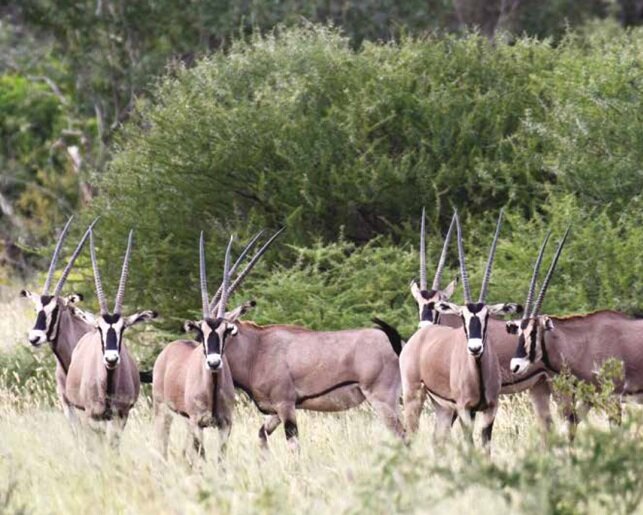Articles
Climate finance isn’t reaching African communities – Cop27 must fix this injustice
Omagano Shooya, Maliasili’s Southern African Portfolio Manager, begins this opinion piece sharing her own experience with climate change. She goes on to argue that a key strategy to addressing these challenges is “by directly and fairly funding the people and local organisations that are driving change and finding solutions to problems such as accessing clean water.”
By Omagano Shooya | Climate Change News, Nov 2022
African civil society organizations are being locked out of conservation funding
African conservation organizations are being shut out of global green finance, according to a new report by Maliasili and Synchronicity Earth—two organizations working to increase social justice in conservation issues in Africa.
By Priya Sippy | Quartz, August 2, 2022
To deliver conservation commitments, funding practices need to change
“Getting conservation funding to effectively support local conservation efforts and interests requires rethinking how conservation funding gets managed, disbursed, and allocated, with new models and practices that can get funding closer to the point of impact.”
By Fred Nelson and John Kamanga | Alliance Magazine, Feb 2022
Collaboration in Response to COVID19
An inspiring effort is taking place in northern Kenya with three organizations - Community Health Africa Trust (CHAT), Grevy’s Zebra Trust (GZT) and Ewaso Lions – rapidly mobilizing a growing collective effort support the communities they work with get urgent health services and support.
Conservation Through Collaboration on Tanzania’s Maasai Steppe
Collaboration and innovation are bringing promise to pastoralists and wildlife that live in one of Tanzania’s most threatened places.
By Fred Nelson, Chira Schouten and Jessie Davie | Swara, Oct - Dec 2018
Developing New Models for Collaboration in Conservation
Three innovative ways groups can work together across organizational fiefdoms and disciplinary siloes to meet conservation challenges locally and globally.
By Fred Nelson & Jeffrey "Jefe" Parrish | Jun. 29, 2018
Five Ways to Advance Conservation Entrepreneurship
Meeting today’s growing conservation challenges requires that we find new ways of thinking about and practicing conservation, rooted in solving social problems through scalable methods and prototypes that deliver results.
By Fred Nelson & Alasdair Harris
From ‘Silverbacks’ to Systems Leaders: Rethinking African conservation leadership (commentary)
Tomorrow’s conservation leaders need to drive systemic change by building organizations and networks that are far greater than the sum of their parts.
Commentary by Fred Nelson and Erin Myers Madeira on 8 September 2016
Bucking the Trend: Lion Recoveries on Community Lands
The latest was a study from Maasai pastoralist lands outside the Maasai Mara, where communities have increasingly been establishing conservancies, often based on joint venture agreements between landowners and ecotourism companies.
By Fred Nelson
To accelerate conservation progress in Africa, improve support to African civil society organizations
African CSOs tend to have the strongest roots and experience with local communities, which makes them best placed to bring about transformative, sustainable and long-term impacts.
Commentary by Fred Nelson and Emily Wilson
Small but Not Silent
Done right, small organizations can hit above their weight and use communications as a foundation for growth, sustainability, and scaling.
By Salisha Chandra & Jessie Davie
The global land rights struggle is intensifying
When Edward Loure, one of the co-authors of this piece, was a boy, his family was evicted from its home in east Africa in order to expand the boundaries of Tarangire National Park, one of Tanzania’s most popular wildlife reserves. Similar evictions had earlier taken place in the Serengeti in the late 1950s.
Edward Loure is 2016 winner of the Goldman prize | By Edward Loure and Fred Nelson
Rethinking conservation funding models in Africa
Much of the discussion in conservation focuses on the limited amounts of funding available. However, an important, but less discussed, issue is how funding is delivered and accessed.
Commentary by Fred Nelson | Leela Hazzah | John Kasaona | Scott O’Connell | Peter Riger | Bernie Tershy
Homegrown African Solutions to Elephant Poaching
Thus far, responding to and combating the elephant crisis have largely been the work of global organizations, including conservation NGOs and multilateral aid agencies. But many of the critical innovations, leadership measures, and solutions to the crisis lie with talented and committed local groups whose approaches can be taken to scale, often with support from resource-rich international networks.
By Fred Nelson





















